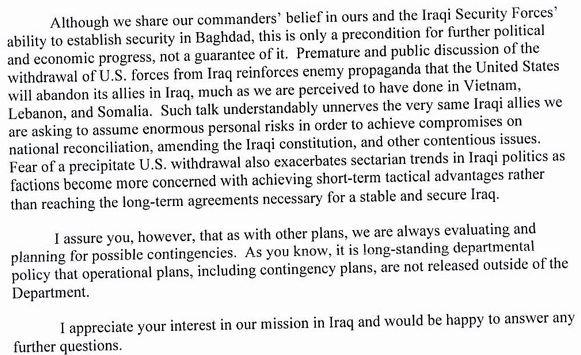Pentagon Rebukes Clinton Withdrawal Plan Request [UPDATE: Not So Much]
Senator Hillary Clinton, a member of the Senate Armed Services Committee, has been asking the Pentagon for months to brief her on the status of planning for a withdrawal of forces from Iraq. Her requests had been ignored until now but they were met by a stern rebuke yesterday from Undersecretary of Defense for Policy Eric Edelman.
AP reports they have a copy of the letter:
“Premature and public discussion of the withdrawal of U.S. forces from Iraq reinforces enemy propaganda that the United States will abandon its allies in Iraq, much as we are perceived to have done in Vietnam, Lebanon and Somalia,” Edelman wrote. He added that “such talk understandably unnerves the very same Iraqi allies we are asking to assume enormous personal risks.”
[…]
Edelman’s letter does offer a passing indication the Pentagon might, in fact, be planning how to withdraw, saying: “We are always evaluating and planning for possible contingencies. As you know, it is long-standing departmental policy that operational plans, including contingency plans, are not released outside of the department.”
While neither Clinton nor any other Member of Congress is in the chain of command, the Defense Department, like all other bureaucracies, is expected to answer reasonable inquires in order that Congress may conduct oversight and complete the budgetary process. Treating a request for information contemptuously is not only politically stupid — Clinton will be voting on budget requests and her colleagues are likely to be outraged about this response as well — but beyond the boundaries of a mere cabinet deputy. As Steve Benen puts it, Edelman’s response was “a) wrong; b) rude; and c) breaking protocol.”
As might be expected for a presidential candidate, Clinton is grandstanding for maximum political mileage.
Clinton spokesman Philippe Reines called Edelman’s answer “at once outrageous and dangerous,” and said the senator would respond to his boss, Defense Secretary Robert Gates.
[…]
Clinton aides said the letter ignored important military matters and focuses instead on political payback. Redeploying out of Iraq with the same combination of arrogance and incompetence with which the Bush administration deployed our young men and women into Iraq is completely unacceptable, and our troops deserve far better,” said Reines, who said military leaders should offer a withdrawal plan rather than “a political plan to attack those who question them.”
It gets better:
“I deeply resent the administration’s continuing effort to impugn the patriotism of those of us who are asking hard questions,” Clinton told ABC News.
Clinton said she heard from a former Pentagon official “that there was intense pressure from the vice president’s office and other places that the kind of detailed planning that’s necessary to take our troops out safely was just not a priority.” The letter from Edelman, she said, gave the impression “that it’s none of my business as to whether or not the Pentagon is doing what needs to be done to secure the safety of our troops.”
Now, of course, nobody here questioned Clinton’s patriotism. Rather, Edelman was pointing out the obvious. Of course the clamoring in Congress for “reinforces enemy propaganda that the United States will abandon its allies in Iraq.” It has already done so. The problem here isn’t with the statement but with the source. That’s a fight that should be carried on by equals.
Clinton’s rhetoric is having its desired effect. MyDD’s Todd Beeton accused Edelman of saying “dissent is anti-American” and “not so subtly questioning Sen. Clinton’s patriotism and, ultimately, her fitness to be commander in chief.” The problem with this line of reasoning is that it was a private letter sent to Clinton, not a press release. Presumably, it was Clinton’s office that released the letter to the press and made it an issue.
So, to recap: While it was doubtless politically motivated, Clinton’s request of the Pentagon was perfectly reasonable given that withdrawal is likely to happen and that the administration has a history of being ill prepared for contingencies. Edelman’s response was idiotic on a whole number of levels and people should be outraged at Pentagon officials thumbing their nose at Congress. The manufactured controversy over the administration’s “questioning of patriotism,” “stifling dissent,” and “using the Pentagon to influence the outcome of elections,” however, is silly.
UPDATE: Josh Marshall has an actual copy of the letter here. Reading Edelman’s response in context, it would seem this controversy is wildly overblown.
The letter is actually quite respectful. And Edelman makes it clear he’s responding on SECDEF’s behalf, not on his own accord.
Marshall’s copy is a photograph, not a PDF, so I can’t cut-and-paste. Here’s a screencap of the controversial portion in context:

This is not a rebuke of Clinton’s question. After spending several paragraphs outlining the plan currently in place, he explains why the administration does not want to publicly discuss plans for withdrawal. The explanation, while succinct, strikes me as reasonable: The Iraqis we are counting on to side with us to defeat the militias and terrorist elements quite rightly fear that we will soon withdraw and leave them vulnerable. If Pentagon officials are going before Congress outlining plans for withdrawal, that perception will be, quite understandably, reinforced. This would undercut the plan that’s currently underway.
Despite that, Edelman assures Clinton that, of course, the Pentagon is working on all contingencies. Since the letter mentions several times that there is no guarantee of success, that presumably includes various plans for withdrawal based on given scenarios.
The only real problem here is the statement that “it is long-standing departmental policy that operational plans, including contingency plans, are not released outside the Department.” I’m certainly unaware of such a policy, let alone that it is “long-standing.” Certainly, though, members of key oversight committees are entitled to demand briefings on at least the broad outlines of these plans under the condition that they be handled as classified information.
Given that AP’s report was supposedly based on “A copy of Edelman’s response,” it’s outrageous that they released quotes out of context to give the appearance of a totally different response than was actually given. Presumably, since Josh Marshall has a copy, the other major news outlets reporting on this story also had a copy of the letter.
UPDATE: Amusingly, Penelope Trunk explains why, “It Doesn’t Matter that Journalists Misquote Everyone.”
Here’s my advice: If you do an interview with a journalist, don’t expect the journalist to be there to tell your story. The journalist gets paid to tell her own stories which you might or might not be a part of. And journalists, don’t be so arrogant to think you are not “one of those” who misquotes everyone. Because that is to say that your story is the right story. But it’s not. We each have a story. And whether or not someone actually said what you said they said, they will probably still feel misquoted.
So, while the quotes from Edelman’s letter totally misrepresented his exchange with Clinton, they were truthful in the context of the story Clinton and the journalists in question wanted to tell.






working on all contingencies as a matter of course for the pentagon.
Does anybody remember the drummed up controversy of a few years ago, wherein it was “discovered” that we actually had invasion plans already established for several friendly countries ?
At the time, such plans were considered “warmongering”. If the subject were to come up today from Mrs. Clinton, doubtless they would be considered so again.
I think, given the existence of those plans, it’s not too far out of line to expect that the pentagon already has withdrawal plans on the books, not that they ever plan to use them until such time as victory is achieved.
That victory, however, is an eventuality that the Clinton candidacy cannot countenance. Thus the overblown response we see from her and her people.
Considering the fact that both houses of Congress are debating about whether we should withdraw or not, I would think it helpful for the DoD to inform them about how such a withdraw would actually occur, what the expected consequences of that withdraw are, and how they would plan on handling those consequences. I would certainly want to know all of that before decided to pull troops out.
The obvious political component of this is the reference to Vietnam, Somalia, and Lebanon. It’s basically a right-wing talking point stuffed right in the middle of what’s supposed to be a business memo.
One of Osama bin Laden’s central organizing tenets has been that the Americans won’t stay and fight if some nominaal amount of pain can be inflicted. It’s a perfectly legitimate point to make in that context, especially since the communication was private.
Now, I strongly disagree with the idea that, because talking about quitting emboldens the enemy , we therefore shouldn’t do it. One price of open debate in a free society is that our enemies (and friends) get the impression we’re divided. But it’s a reasonable enough point to make.
So all Osama has to do is question our machismo, and we’ll do any stupid thing just to prove him wrong?
Just as a matter of pure coincidence, I’m sure, this basically endorses any excuse the military wants to make to Clinton as eminently reasonable, no matter how precisely it matches right-wing talking points. In the meantime, of course; she’s in the process of attempting to fulfill her Constitutional obligations (ones which she shirked the last time around, I’ll gladly admit).
If the parties were reversed here, you’d be crying bloody murder.
Yes. See: George W. Bush
Not at all. Clinton has apparently asked SECDEF Gates for a classified briefing rather than public testimony. I presume it will be forthcoming.
I’m merely defending Edelman from charges that his response was rude and a rebuke; it wasn’t. Indeed, as I noted,
I disagree. The tone was obvious; the words were lifted from right-wing talking points; and it didn’t show any deference whatsoever to Mrs. Clinton’s Constitutional responsibility. The stuff about Vietnam and Somalia and Lebanon could just as easily have been left out. That’s a good test of your theory, actually. Why on earth did it need to be in there if the main point was “we want this to be a classified briefing”? The only logical purpose of putting it in was to score political points, which is not seeming for the military.
Here’s another good test: Imagine one of your indirect bosses in your company asks you for a report which you don’t have the authority to cc all over the place. Would you respond like this, basically chastising your (indirect) boss for asking in public? Or would you just say “I can’t share that information in public” and leave it at that?
But, of course, you never mind when those political points are attacks on the Democrats. Are you listening, Monica?
First, this was a private letter to Clinton, not a press conference. Second, Edelman is a civilian appointee of the president, not a member of the uniformed services.
Clinton is not Edelman’s boss, indirectly or otherwise. Bob Gates is his boss and then the president.
Congress has oversight authority over the DoD and its officials should be courteous and forthcoming. Edelman has, he says under direction from Gates, outlined what the executive is doing and why it does not want to hold public hearings. He says he’s happy to answer further questions.
James must have had his chain pulled by Rove. He has fallen back into line and trying his best to spin this in favor of the Party.
James, Clinton’s letter to Gates requesting information was not private so any response could not be considered private either. That Gates choose Edelman to send an insultingly non-responsive letter to her still does not make it private.
And secondly, while Edelman may have been appointed by the president his oath of office is to the constitution, not to Bush. You republicans need reminding of that.
Actually, executive officials swear the following:
Edelman is not, nor is any executive official, taking an oath to interpret the Constitution, merely carry out his duties under it. If his boss gives him an order, he’s expected to carry it out.
James, you being a republican I can understand your putting obediance to the leader over obligations to the constitution.
BUT. The rest of us understand that the swearing of an oath to the constitution creates an obligation above the obligation to follow the bosses orders. It requires some independent judgement that the orders are in compliance with the overall obligation to the constitution. If someone is unwilling or unable to make this distinction they should not be in our government.
And if that person’s independent judgment tells him that the constitution gives the executive branch the discretion to decide which cases to prosecute and which not to prosecute, then what? Do you stand by your assertion that their independent judgment should be followed?
Within reason, of course. If the President told someone to break into the opposition party’s offices and steal documents from them, obviously they shouldn’t follow those orders.
However, there is a huge difference between refusing to follow an order, and acting without orders or after being told not to act. In this case, the prosecutors are being told not to prosecute someone. There is nothing illegal about not prosecuting, so there is no legal reason why the order should not be followed.
You are confused as to the purpose of the oath.
The oath doesn’t protect us from bad people following bad orders.
It does however give good people the obligation and the justification to act independently from the boss when needed.
Sure, sure. Even junior noncoms in the Army are expected to stand up against obviously illegal or immoral orders. In actual application, of course, that gets damned tricky.
In this case, though, Edelman claimed to be speaking for Gates who, presumably, is doing what the president wanted. Certainly, nothing in the letter is illegal.
Actually I was just asking for a clarification on your position, I wasn’t trying to make any statements about the oath. I’m still unsure if you believe that the individual has the right to decide which orders are constitutional and which are not.
You seem to imply that he does, but at the same time criticize him for making an independent decision you disagree with. So I’m trying to determine who you feel has the ability to make that call, and if you will stand by your assertion that they have that ability even when you disagree with their call.
BTW, James, I’ve twice now seen several errors when trying to post a comment. Something about unlink failing and trying to modify headers after content has been sent. Looks like PHP errors, but I pressed the back button before I thought to copy them. If I see them again, I’ll let you know the details.
What was not clear about my response?
Look. The oath empowers people in government to act and think independently. What more of a clarification do you need?
It does not help us when people will not exercise their responsibility. It does help us when people feel empowered enough by it to question what is going on or to take some independent action. We are better off when appointed officeholders are more beholden to the duties of their office than they are to the person who put them in office.
Now I understand that people like Joyner think of appointed governmental officials as working in a political office and having political duties but they are simply wrong. The office duties are to all Americans regardless of politics. I know this is tough for conservatives to understand but that is the way it is.
I don’t have any heartburn with that in theory. As a practical matter, though, we expect subordinates to carry out the wishes of their superior so long as the orders are legal.
If the president orders someone to do something clearly illegal, they should refuse. Practically speaking, that means they resign on the spot, as happened with Nixon in the Saturday Night Massacre.
There are even times when a subordinate might actually put a superior under arrest, although, again, the scenario has to get pretty far-fetched.
Ultimately, the president is responsible for “Faithfully executing the laws.” If he’s not doing that to Congress’ satisfaction, they can either impeach him or get the Supreme Court to side with them. Otherwise, you have a standoff.
And, incidentally, Congress isn’t always right. In this particular case, my inclination is that they probably are. But presidents are elected to exercise independent judgment.
See, that is what is not clear. You say that the individual has the responsibility to think independently, then accuse them not not doing so if they come to a conclusion you don’t agree with. Either you let the individual decide and accept their decision, or you don’t. I can’t tell which side you fall on.
The problem with that is that most government workers are not elected to their position, nor confirmed to their position by an elected official. Those people should not have the ability to make decision about what policies are good for “all Americans” or not. For the most part, they should follow the orders of those who are accountable to the electorate, otherwise electing them in the first place is irrelevant.
Michael, why is it you confuse ‘appointed’ government official, those who take an oath of office, with other government officials, like those who take a civil service exam?
If you really do not know even the basics about such matters it is no wonder you remain confused.
Joyner was the one who said that all Edelman was doing was his job which was to obey his boss. I was pointing out that his obligation is not to his boss but to the constitution.
I further pointed out that the oath gives people the responsibility as well as the justification to question authority and to act independently when needed.
I also pointed out that while it helps to have good people in appointed office who will take this obligation seriously it does not help us at all to have political lackeys in office who think their obligations are to the person who appointed them.
I fall on the side of independent thinking and loyalty to the nation.
I take it you fall on the side of obedience and loyalty to the party.
Ken, I’ve been a registered Democrat since I turned 18, and have voted mostly Democrat in every election, so please take your arrogance down a notch or two.
James pointed out that the message was merely being relayed through Edelman on behalf of Sec. Gates. Now the people that “all Americans” elected to represent us got together and the majority decided that Gates was qualified to perform the requirements of the job and rational and “independent thinking” enough to know when order from his “boss” were unconstitutional. So the people we elected to represent us decided that Gates was capable of representing them. That’s how representative government works.